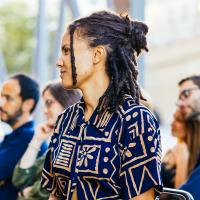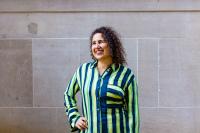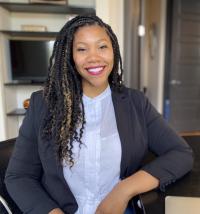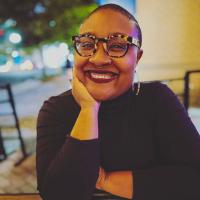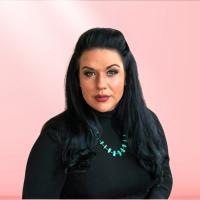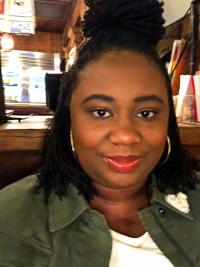Fellowships
The Douglass Center awards a limited number of summer grants of $5,000 to ARHU faculty members (PTK or TTK) and graduate students to support the development or advancement of a publicly-engaged research project.
We have an expansive understanding of “publicly-engaged research.” Such research may include—but is not limited to—the following: co-production of knowledge between faculty and community members, interdisciplinary work or collaboration (on or off campus), work that engages the histories and/or artifacts of local communities or institutions, work that will have an impact on local community or institutions, work seeking to understand or document social justice initiatives from the past or present, and/or the development of new courses that do any of the above. The Center is especially excited to support research or pedagogical projects that resonate with and help to support our mission. Fellows will give a public presentation during the academic year as part of the Douglass Center's Humanities Dialogues series.
2024 Douglass Center Graduate Student Fellows
Elizabeth Bryant, M.F.A. student, English
Project Title: Black Interior Magazine
Project Description: Utilizing archival sites in Minnesota and Maryland, Black Interior Magazine weaves together the lives, vestiges, and reportage of black people–real and imagined, past and present–who have stewarded life in small-town and rural environments across several centuries. The project also provides a space for the extents of critical fabulation to be expanded and refined.
Bio: Elizabeth L.R. Bryant is a writer and lifelong student of the Minnesota River Valley. Her artistic practice and writings explore black interiorities, especially in rural and small town environments in the midwest. She has a B.A. in history and black studies, and has served as a literary nonprofit manager, publicist, events programmer, barista, nanny, butcher, and farmer-trainee. Elizabeth is a founding member of the Minneapolis-based artist collective Burn Something, a Kimbilio fellow, a Juniper Institute scholarship recipient and a current MFA student in fiction at the University of Maryland. With her husband, Taylor Johnson and the poet Simon Shieh, Elizabeth curates the Green Way Reading Series, a monthly literary event in Takoma Park, Maryland.
Kristy Li Puma, Ph.D. Candidate, American Studies
Project Title: Our Clubs: DC’s Shimmering Informal Black and Latinx Spaces of Liberation, 1970-2000
Project Description: Washington, DC is home to shimmering, subtle, and sustaining underground cultural worlds, but these worlds are often only known by longtime locals to the city or its surrounding areas. Through community-based interviews with Latinx and Black cultural leaders and artists, Our Clubs brings to light these crucial and understudied sites of knowledge and traces as a history of Washington, DC’s underground dance clubs, drag performance collectives, block parties, nascent festivals, and do-it-yourself radio shows.
Bio: Kristy Li Puma is DC-based cultural worker and a PhD Candidate in American Studies at UMD. Prior to graduate school Kristy served for a decade as a high school educator, creating programs to support young people of color in developing and enacting their capacities for personal and collective liberation. She believes in the vitality of educational spaces to develop the critical thinking, creativity, agency, and compassion necessary for solving real-world problems and inequities.
A DMV local herself, Kristy’s current research focuses on the history, politics, and world-making practices of DC’s Black and Latinx cultural communities from 1970-2000, in spaces such as underground dance clubs, radio stations, and block parties. As she investigates history with living community members she also curates public conversations and collaborative exhibits at places like local libraries and schools. Her research and public programs have been supported by Humanities DC, the Smithsonian, the DC History Center, Project STAND, and several UMD units including AADHUM and The Frederick Douglass Center for Leadership through the Humanities.
Sarah Scriven, Ph.D. Candidate, Women, Gender and Sexuality Studies
Project Title: Black Women’s Scrapbooks: A Look from Within
Project Description: Twentieth-century, U.S.-based Black women have used the domestic craft of scrapbooking as a site of information management and self-expression. Drawing on archival research and visual and rhetorical analysis, Black Women’s Scrapbooks explores how these personal archives have enabled Black women to document political ideologies in sites alternative to white heteropatriarchal institutions traditionally held as intellectual.
Bio: Sarah Scriven is a PhD Candidate in the University of Maryland Harriet Tubman Department of Women, Gender, and Sexuality Studies. Sarah’s research interests include Black feminist intellectual histories, Black feminist pleasure politics, visual culture, and Pauli Murray’s historiography. Her dissertation, Black Women's Scrapbooks: A Look from Within, examines how U.S.-based, twentieth-century Black women have used the domestic craft and information management practice of scrapbooking as sites of knowledge production and self and community representation. She has served on several initiatives to promote gender and racial equity, such as the Pauli Murray Center for History and Social Justice, the UN Commission on the Status of Women, and Take Back the Halls, a dating violence intervention program. She earned an MA with distinction in Women’s and Gender Studies from DePaul University and a BA from Duke University in Women’s Studies, with a minor in African and African American Studies.
2024 Douglass Center Faculty Fellows
Briana Barner, Assistant Professor, Department of Communication
Project Title: Black Podclass Virtual Speaker Series
Project Description: Dr. Barner will organize a speaker series that will serve as an extension of the public scholarship she has done with her Black Podcasts class and their Black Podclass podcast. This series will bring together a plethora of podcast hosts, producers and scholars to discuss a variety of topics that will be of interest to those who want to learn more about podcasting, or who want the opportunity to connect with a community of podcast lovers. Dr. Barner has had several people ask if they can participate in her class–this is her way of extending class outside of the walls of UMD.
Bio: Dr. Briana Barner is an Assistant Professor in the Department of Communication at the University of Maryland. She received a doctorate in Radio-Television-Film and a doctoral portfolio in Women’s and Gender Studies from the University of Texas. Briana also earned a Master’s in Women’s and Gender Studies from UT. She is an interdisciplinary critical and cultural communications scholar with research interests in Black podcasts, digital and Black feminism, digital media, Black cultural production and representation. Her work has been published in Radio Journal: International Studies in Broadcast & Audio Media, Film Quarterly, and the edited collection Saving New Sounds: Podcast Preservation and Historiography, Feminist Approaches to Media Theory and Research and Black Sisterhoods: Paradigms and Praxis. Briana is currently working on a manuscript about the cultural production of Black podcasts.
Shelbi Nahwilet Meissner, Assistant Professor, Department of Women, Gender, and Sexuality Studies
Project Title: Black and Indigenous Climate Futures Faculty Fellowship
Project Description: The Black and Indigenous Climate Futures Faculty Fellowship provides space for a dynamic cohort of scholars to engage in critical work at the intersections of land, climate, and coalition-building. Aiming to develop a community workbook, syllabus, and community-led projects that center the work of Maryland-based partners and uplift the histories, practices, and visions that have shaped the region’s food systems since time immemorial, the fellows hope their offerings will be taken up by book clubs, church groups, and community centers, fostering deeper engagement with land, food sovereignty, and collective liberation. Additional forthcoming initiatives include the The CEDAR Gallery (Centering Ecologies, Diasporas, and Ancestral Roots), will serve as a space for engagement with climate, land, and food justice work, and The Indigenous Research Advisory CIRCLE, which will provide ethical research advising for UMD researchers and students.
Other 2024–2025 fellows of this cohort are Kayle Krieg (White Earth Anishinaabe), Chad Infante, Jayson Porter, and Bayley Marquez (Santa Ynez Band of Chumash).
Bio: Dr. Shelbi Nahwilet Meissner (Luiseño/Cupeño) is an Indigenous feminist philosopher. She is an Assistant Professor in the Harriet Tubman Department of Women, Gender, and Sexuality Studies at the University of Maryland and the founding director of the Indigenous Futures Lab.Her work focuses on Indigenous research and evaluation methods, language reclamation, Indigenous epistemology, and community-based methodologies. She is committed to building research environments that center accountability, relationality, and transformative justice. Through her leadership, the Black and Indigenous Climate Futures Faculty Fellowship has become a space for coalition-building, land-based pedagogy, and collaborative scholarship at the intersections of climate justice and Indigenous and Black futurisms.
Cecilia Shelton, Assistant Professor, Department of English
Project Title: Act Like You Know: Black Folks, Pop Culture, & Politics
Project Description: Inspired by the argument of Cecilia Shelton’s forthcoming book, Act Like You Know: A Black Feminist Methodology for Technical and Professional Communication, the Act Like You Know event stages a conversation between Cecilia and Ddm, host of the Secretary of Shade Youtube Channel, where he discusses politics and culture. Ddm brings a unique and decidedly Black queer perspective to his political commentary, inhabiting a tone that runs counter to the stuffy, pithy, clipped-to-go-viral ethos of politics content on social media. Our conversation focuses on how Ddm’s deep knowledge of Black queer culture and language (and its influence on pop culture more generally) functions as a tool for translation and analysis in his commentary and produces a unique form of political education for his audience.
Bio: Dr. Shelton’s scholarship has appeared in The Journal of Multimodal Rhetorics, Technical Communication Quarterly, IEEE, and Pedagogy and Praxis: A Writing Center Journal among other publications. In 2021, she earned both the CCCC Outstanding Dissertation Award in Technical Communication and the CCCC Technical and Scientific Communication Award in the category of Best Article on Pedagogy or Curriculum in Technical or Scientific Communication. Her forthcoming book project, Act Like You Know: Black Feminist Methodology in Technical and Professional Communication, makes a Black Feminist methodological intervention into technical and professional communication as she broadens notions of work and workplace to include activism and other Black cultural rhetorical practices, framing the work of Black rhetors as a kind of technical communication. Broadly speaking, her scholarship is situated at the intersection of Black feminisms, cultural rhetorics, and writing studies.


